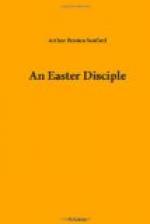“Is it true,” asks Quintus in breathless words, “that your Master has risen from the grave? I have been away in Tyrus. Now in the Roman camp on Scopus I have heard that he has come forth from the sepulcher. What means such a marvelous report?”
“Yes, it is all true,” John answers with his face aglow; “this is the very sepulcher where our Lord was laid. Your own sentries kept guard before the tomb securely sealed. But on the morning of yesterday there was a shaking of the earth; some angelic visitants rolled away the stone door of the grave; and our immortal Christus came forth again.
“Astounding,” Quintus interrupts in a whirl of words; “but did he make any promise of another life for men, before he was put to death?”
“He truly did,” replies the disciple; “when we had eaten the Passover supper with him, he spoke a word more marvelous than any of your Roman teachers has ever uttered. Into the spirit world he said he was departing, to make ready a room in the Father’s ample house for those who were his own; and on his return he would take them to be with himself. Ever since our sad-hearted band have been comforting themselves with this last promise in the upper room.”
“None of our Roman gods has ever promised such a future.” responds Quintus; “but is this all?”
“No,” answers the disciple; “on his cross our Christus spoke again about another experience for men. By his side was Dysmas, the crucified robber, grieving for his faults and asking comfort. When the cross pain and thirst were over, our Lord replied, the outlaw should walk with him among the bowers of the beautiful Paradise beyond this world’s horizon. It was enough. In this consolation the tortured Dysmas passed on, with a smile of peace upon his face.”
“Have you more wonders to tell?” presses Quintus, in his eagerness, while the story of the cross begins to compel his judgment and call for his heart’s surrender.
Then, the consummation! In ecstatic words John tells of the one final and overmastering proof, in the thought of the eleven disciples;
“Greatest of all, we have ourselves seen our Friend again. Five times already has he showed himself. First, Mary of Magdala saw him under the trees of the garden, and spoke with him; then the other women met him and fell at his feet; next our fellow disciple Petros saw him; then two of our band walked with him to outlying Emmaus, and knew him as he broke bread at the journey’s end; and then last evening, he came to ten of us in the Passover room and spoke his peace on us.
“Perhaps you have all seen a spectral form which has no real existence,” remonstrates Quintus, while all the time he is yielding himself to the compelling story.
“It cannot be,” responds the convincing John; “there have been too many witnesses for that. We have seen the very wound made by the spear of Longinus; we have heard his familiar voice; we have received his blessing. Our number is our evidence; it cannot be possible that all of us have been deceived. It is surely he, O Roman soldier, unless the senses of the women and of ten honest men are far astray. No other teacher of the East has ever come back from the sepulcher. Look and see for yourself. Yonder is Joseph’s empty tomb. The Christus is himself the evidence.”




